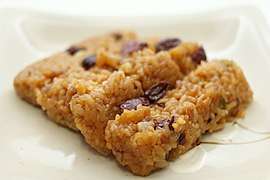Yaksik
Yaksik or yakbap (literally "medicinal food" or "medicinal rice") is a sweet Korean dish made by steaming glutinous rice, and mixing with chestnuts, jujubes, and pine nuts. It is seasoned with honey or brown sugar, sesame oil, soy sauce, and sometimes cinnamon. It is traditionally eaten on Jeongwol Daeboreum (정월대보름), a Korean holiday which falls on every 15 January in the lunar calendar, but also for weddings and hwangap festivities.[1]
 | |
| Alternative names | Yakbap |
|---|---|
| Place of origin | Korea |
| Region or state | Korean-speaking areas |
| Main ingredients | glutinous rice, chestnuts, jujubes, and pine nut |
| Other information | Typically consumed during Jeongwol Daeboreum, weddings and hwangap festivities |
| Yaksik | |
| Hangul | 약식 / 약밥 |
|---|---|
| Hanja | |
| Revised Romanization | yaksik / yakbap |
| McCune–Reischauer | yaksik / yakpap |
Etymology
Yaksik got its name due to the use of honey in its ingredients. According to the etymology book A-eon Gakbi (hangul:아언각비, hanja:雅言覺非) written in early 19th century Joseon, it is noted that honey was commonly called as yak (medicine). Thus honey buckwheat wine was called yakju (약주), honey rice was called yakban (약반, old word for yaksik), and fried honey ricecake was called yakgwa (약과).[2]
History
Records of yaksik can be found in Samguk Yusa, written in the 13th century.[2] Legend says that King Soji of Silla headed on a journey on the 15th of January, 488, when a crow alerted him of danger. The King saved himself from a potential revolt thanks to the crow's warning and the day of January 15 was designated as a day of remembrance thereafter. Glutinous rice was put up as an offering during the commemorative rites, which became the origin of yaksik.
The adding of pine nuts, chestnuts, jujubes, honey, and oil were added in the Goryeo era. Yaksik is also mentioned in various books from the Joseon period such as Dongguk Sesigi (동국세시기), Yeolyang Seisigi (열양세시기), Dong'guk Yeoji Seungram (동국여지승람). In Yeolyang Seisigi, it is said that envoys to China shared yaksik with the people in Yeonkyung, and most enjoyed the dish.[2]
Cooking
Glutinous rice is steamed and mixed with honey, brown sugar, and ganjang to colorize the rice. Soft-boiled chestnuts, pine nuts, sesame oil and quartered jujubes with the seeds removed are added to this mixture with the entire mix is resteamed. The yaksik is then put into desired shapes such as flat squares and left to cool before eating.[3]
References
- (in Korean) Yaksik at Encyclopædia Britannica Korea
- (in Korean) Yaksik at Korean Culture Encyclopedia
- (in Korean) Yaksik at Doosan Encyclopedia
- Hi Soo Shin Hepinstall; Sonya Hepinstall (2001). Growing Up In A Korean Kitchen: A Cookbook. Ten Speed Press. p. 227p. ISBN 1-58008-281-5.
- (in Korean) Yaksik at Doosan Encyclopedia
- (in Korean) Yaksik at Digital Gangneung Culture Almanac
- (in Korean) Yaksik at Korean Culture Encyclopedia
External links
- Recipe: Yaksik (Sweet Rice with Nuts & Jujubes) at The Seattle Times, 2006-01-04
- Yaksik, tasty and healthy treat, Paik Jae-Eun, Professor of Food & Nutrition, Bucheon University. Koreana magazine Winter 2008.